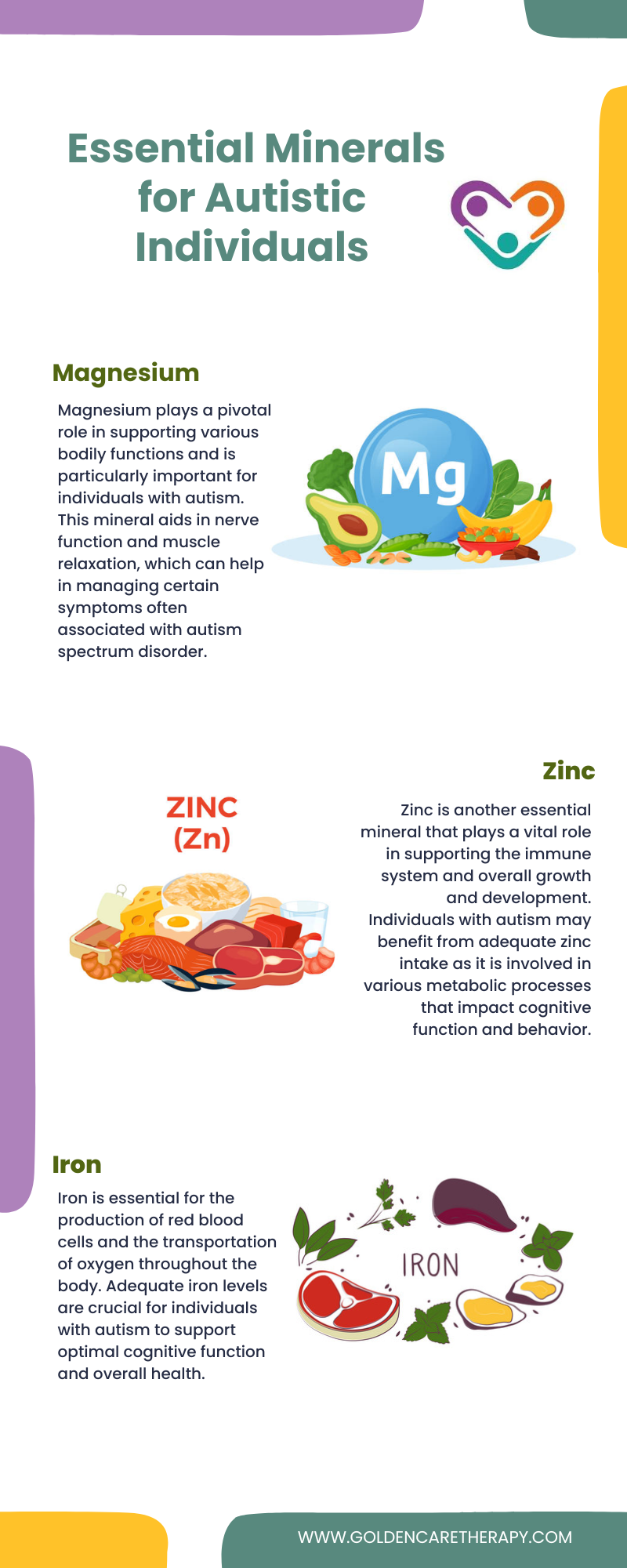Nutrition plays an important part in the well-being of every person, but for individuals on the autism spectrum, the right balance of vitamins and minerals can make a significant difference.
These essential nutrients can help support everything from mood and behavior to focus and overall health.
While diet alone may not address all challenges, understanding how specific vitamins and minerals impact the body can provide valuable insights into managing certain symptoms. By nourishing the body with the right nutrients, it’s possible to promote a better quality of life and support developmental needs.
Importance of Nutrition for Individuals with Autism

Nutrition plays a significant role in the overall well-being of individuals with autism. Proper nutrition can support cognitive function, behavior management, and overall health for individuals on the autism spectrum.
It is important to understand the impact of vitamins and minerals on the development and functioning of individuals with autism.
When considering the nutritional needs of individuals with autism, it is essential to focus on providing a well-rounded diet that includes essential vitamins and minerals. Certain vitamins like Vitamin D, Vitamin B6, and Vitamin B12, along with minerals such as Magnesium, Zinc, and Iron, are particularly important for individuals with autism.
Ensuring that individuals with autism receive adequate nutrition not only supports their physical health but can also potentially have a positive impact on their behavioral and cognitive development.
Key Vitamins for Autism
Certain key vitamins play a vital role in the overall health and well-being of autistic individuals. Let’s look at each of them.
Vitamin D
Vitamin D, often referred to as the “sunshine vitamin,” is crucial for overall health and immune function. For individuals with autism, Vitamin D plays a pivotal role in maintaining bone health, supporting cognitive function, and regulating mood.
Research suggests that individuals with autism may have lower levels of Vitamin D, making supplementation or adequate sun exposure essential.
Vitamin B6
Vitamin B6, also known as pyridoxine, is a water-soluble vitamin that is involved in various metabolic processes within the body. In the context of autism, Vitamin B6 is recognized for its potential to support neurotransmitter function and aid in the management of behavioral symptoms.
Vitamin B12
Vitamin B12, or cobalamin, is another essential vitamin that plays a crucial role in neurological function and red blood cell production. Individuals with autism may be at a higher risk of Vitamin B12 deficiency, which can impact cognitive function and overall well-being.
Ensuring adequate levels of Vitamin B12 through supplementation or dietary sources is critical for supporting individuals with autism.
Understanding the role of Vitamin D, Vitamin B6, and Vitamin B12 in supporting individuals with autism lets parents and caregivers make informed decisions about incorporating these essential vitamins into their loved one’s diet or supplementation regimen.
Consulting with healthcare providers and considering individual needs are key steps in promoting optimal health and well-being for individuals with autism.
Essential Minerals for Autism
Just like vitamins, ensuring individuals with autism receive adequate minerals is crucial for their overall well-being. The essential minerals for autism are as follows:

Ensuring a well-balanced diet that includes foods rich in magnesium, zinc, and iron can help individuals with autism maintain optimal mineral levels.
Additionally, consulting with healthcare providers for personalized recommendations and monitoring mineral intake can further support the overall health and well-being of individuals on the autism spectrum.
Considerations when Supplementing

That said, there are important considerations that need to be taken into account when supplementing vitamins and minerals to ensure the optimal health and well-being of individuals on the autism spectrum.
Before starting any supplementation regimen, it is crucial to consult with healthcare providers, such as pediatricians, nutritionists, or autism specialists. These professionals can provide personalized guidance based on the specific needs and requirements of the individual with autism.
They can also offer valuable insights into potential interactions between supplements and any existing medications.
Also, since each individual with autism is unique, this means their nutritional needs may vary. Taking an individualized approach to supplementation is essential to address specific deficiencies or requirements.
Regular monitoring of supplement intake is important to ensure its efficacy and safety. Healthcare providers may recommend periodic blood tests or assessments to track the levels of vitamins and minerals in the body.
Based on the results, adjustments to the supplement dosage or formulation may be necessary to address any deficiencies or excesses.
Incorporating these considerations into the supplementation process can help parents and caregivers make informed decisions regarding the use of vitamins and minerals for individuals with autism. For those seeking personalized guidance from ABA centers in New Jersey, New York, Georgia, and Indiana, Golden Care Therapy can offer you valuable support through expert care. To learn more about tailored therapies and how they can benefit your loved one, contact us today to explore options and get started on a path to improved well-being.
Sources:
https://www.autismparentingmagazine.com/best-supplements-vitamins-autism/
https://pubmed.ncbi.nlm.nih.gov/36229781
https://www.thetransmitter.org/spectrum/the-link-between-vitamins-supplements-and-autism-explained/



